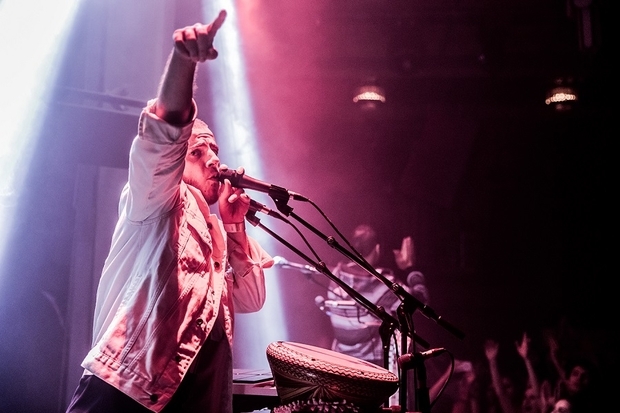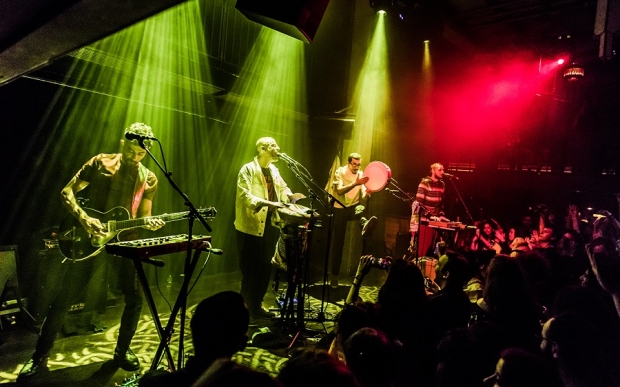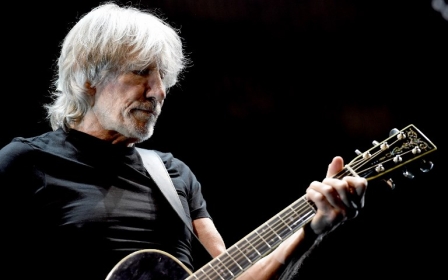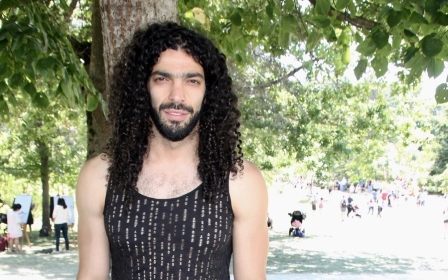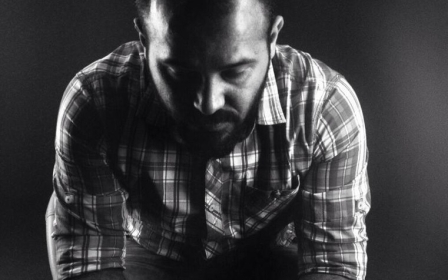Meet the Palestinian band 47Soul: 'Our message is universal'
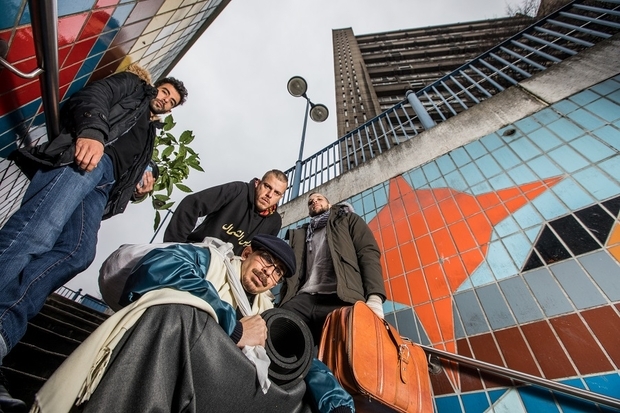
LONDON – A diverse crowd is swaying and stamping their feet at London's Jazz Cafe to the distinct melody by Palestinian band 47Soul they call "shamstep" – a mixture of traditional dabke music fused with electronic beats, hip-hop and a touch of reggae.
Here to launch their debut album, Balfron Promise, the band are relishing the warmth of the audience's reception.
“It feels magical," says Tareq Abu Kwaik backstage, before the concert, which took place earlier this month. “We know there are a lot of people at home sharing it right now… it’s great.”
The band’s four members all share Palestinian roots. Tareq (El Far3i) and guitarist Hamza Arnaout (El Jehaz) were flatmates in Amman, Jordan, and at first worked on different musical projects before coming together to form the band.Their parents took refuge in Jordan during the 1948 Nakba (Catastrophe), the expulsion and dispossession of hundreds of thousands of Palestinians from their homes in the war that led to the founding of Israel.
Walaa Sbeit was born and raised in Haifa and holds an Israeli passport, while Ramzy Suleiman (Z the People) grew up in Washington DC before moving to Palestine.
The amount of oppression where we’re from is hard to comprehend for someone not from there
- Tareq Abu Kwaik, 47Soul
Being all part of the same alternative Arab music scene in the Middle East, the four band members first connected online. The main challenge was “not being in one place and play[ing] music together,” says Tareq, but that “triggered the whole idea of 47Soul”.
After exchanging tracks through social media, they formed the band in the Jordanian capital in 2013 where they played their first concert.
In 2014, they got the opportunity to play several concerts in the UK, and in 2015 and 2016, they performed at the Glastonbury Festival. They also managed to perform a concert in the West Bank for the first time in 2016.
Their current tour will take them not only to venues across the UK but also to Belgium, Germany, Switzerland and France, ending in Poland on 29 June.
Broken promises
The name of their album, Balfron Promise, reflects not only on their time in London, where the band has been based for more than three years, but also serves as a reminder of how deeply connected they are to what is happening in Palestine and the Middle East.
The band members temporarily rented a flat in Balfron Tower, a high-rise originally designed by the legendary Hungarian-born architect Ernö Goldfinger in 1968, to provide social housing in East London. The local housing association "decanted" longstanding council tenants in order to refurbish the apartments and then sell them as luxury flats on the private market.
According to Tareq, there are parallels between the building’s transformation and what is happening back home in Palestine.
"Thinking of the tower and what we’re doing there and the history of our ancestors, [and] our people having to leave because someone thinks this land should be theirs, versus leaving a building because someone thinks this building would do much better as a mall [for example] … [there are] parallels," he says.
The album title, he adds, started as a joke, like how they came up with the name shamstep. Balfron Promise is a play on their London residence and the 1917 Balfour declaration, a letter written by British foreign secretary Arthur James Balfour, who voiced the British government's support for the establishment of a Jewish national home in Palestine.
The Balfour declaration is often seen as a crucial step that led to the creation of the State of Israel in 1948.
Charged lyrics
Despite having lived in the UK for more than three years, Tareq and Hamza insist they stay connected to their friends and family back home.
This is a great time to have conversations with the world via music, especially for Arab youth
- Tareq Abu Kwaik, 47Soul
“The amount of oppression where we’re from is hard to comprehend for someone not from there,” Tareq says. “Every day is like, 'where am I?'- backstage, playing music, touring the world, this is great,” while his cousin would tell him an extreme story about what is happening back home.
Nevertheless, as a Palestinian-Jordanian rapper, he says people are surprised to hear that he has not faced oppression in Jordan, but “it’s always a worry”.
“I don’t call [politics] my subject, it’s the seasoning in the flavour of everything I write. It’s just simply put in the context of my life," Tareq says.
This sentiment also extends to the actions of other artists. Both Tareq and Hamza voiced their deep disappointment at Radiohead’s decision to play a concert in Israel in July 2017.
“This is apartheid. It’s going to be embarrassing for these artists hopefully when all of that is gone and people live peacefully on a land that is not forced,” Tareq says of their decision.
Over the years, many artists such as Roger Waters of Pink Floyd have chosen to support the Boycott, Divestment, and Sanctions (BDS) movement against Israel by not playing shows in the country.
Reflecting on their own political influence, Hamza is rather cautious.
“If we have political influence, it will be maybe in ten or fifteen years,” he says. “But I really believe in the political influence of artists in the Arab world and I think politicians are not really aware of that power. It’s going to shift.”
Tareq and Hamza enthusiastically support the notion that more people are becoming aware of the Palestinian issue.
“This is a great time to have conversations with the world via music, especially for Arab youth. When you are on the right side of it, there’s nothing to fear,” Tareq says.
A voice for the youth
Across the Middle East and North Africa, local musicians were seen as key participants in the 2011 uprisings that started in Tunisia and then swept throughout the whole region.
Syrian-American artist Omar Offendum, for example, integrated the infamous slogan “the people want the downfall of the regime” into one of his song about Syria, while Egyptian rock rebel Ramy Essam did the same during the 2011 uprising in Egypt in his song Irhal (Leave).
Hamza is equally hopeful that 47Soul can set a good example for Arab youth. “We are proving tonight, by releasing our first album, that you can actually do that if you have a solid idea of where you are going.”
However, the band is not only targeting a Middle Eastern audience.
“People in the UK have the feeling 47Soul belongs to them, which is a great thing. I agree with them,” Hamza says. “47Soul is a Palestinian-Jordanian band that was nurtured, grew up in the UK. We want [our] whole message to be universal.”
This is “not an East-West conversation, it’s about the world,” Tareq concludes.
New MEE newsletter: Jerusalem Dispatch
Sign up to get the latest insights and analysis on Israel-Palestine, alongside Turkey Unpacked and other MEE newsletters
Middle East Eye delivers independent and unrivalled coverage and analysis of the Middle East, North Africa and beyond. To learn more about republishing this content and the associated fees, please fill out this form. More about MEE can be found here.


